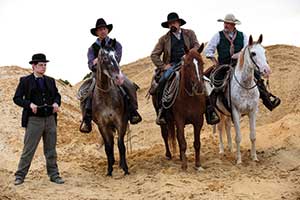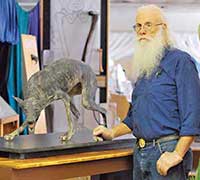Russian roulette
Posted By richm On 27-04-2015 @ 5:22 pm In Features | Comments Disabled
Russia’s once profitable TV industry has undergone huge regulatory changes over the past year and suffered a plunging currency. Richard Middleton considers what’s next.

Historical drama Myth Hunters
It’s been a turbulent 12 months for Russia, and those operating in its television business haven’t escaped unscathed. Domestic and international players have faced assaults on a variety of fronts, leaving them battered, bruised and wary.
Yet as the risks ramp up, so do the potential rewards for those sticking it out. Regulations are squeezing international channel operators and distributors, and the advertising market is limp, to say the least. But executives both in Russia and abroad are looking on with apprehension – well aware of what could go wrong but equally keen not to miss out once the troubles have calmed.
The obstacles – perhaps most notably a pay TV advertising ban and a reduction in the foreign ownership ceiling – have all been well-documented but nevertheless came out of the blue. And that’s important because even now, almost nine months since the first regulatory murmurings emerged from the Kremlin, companies are still working out what to do next.
Part of the reason is that the TV industry – not to mention the politicians – are still exploring the full ramifications, explains Steven Eke, senior analyst for Russia and former Soviet Union at UK advisory group Control Risks.
“The regulatory and legislative framework is in a state of flux, but when the Duma, the Russian parliament, looked at the question of the shares of foreign operators and the issue of banning ads on pay TV it simply didn’t look at the legislation in any detail,” he says. But despite their rapid introduction, Eke expects much of the legislation to stay.
The reason for that – and one of the driving forces over what could happen next – is President Vladimir Putin.

Irina Gofman
“The essential thing is that the decline in the audience of the big three domestic channels – which are absolutely state-controlled, both editorially and in terms of distribution – has been drastic,” Eke explains. “It’s gone from 60% to just under 40% between 2003 and 2013, and given the political and ideological significance of TV, the government’s keen to ensure it remains under state control. So the whole prerogative of changing ownership and ensuring that domestic producers – by which I mean state producers – retake the market is something we shouldn’t expect to shift.”
The landscape is changing daily, however, despite the bristling reproach that led some, including NBC Universal (NBCU) and Turner Broadcasting, to initially scale back their Russian operations. NBCU-owned Universal Networks pulled its Universal Channel and E! Entertainment Television from Russian pay TV in January, while Turner’s global news channel, CNN International, also cut its service before re-entering after renegotiating its distribution deal.
The subject of Russia remains a political hot potato, though, so it’s little surprise most execs with intimate knowledge of – and stakes in – the country weren’t prepared to stick their heads above the parapet regarding their next moves. But most of those insiders, as well as Eke, suggest that a “mass exodus” is not on the cards.
David Zaslav, CEO of Discovery Communications, which currently airs its pay channels in Russia without ads, reiterated this during a call with investors in February, spelling out that the company had “conviction” in Russia. He also suggested some regulations could be re-evaluated and added that the country remains a “long-term growth market.” Choppy waters maybe, but don’t expect too many abandoned ships.

Mysteries at the Museum
One international broadcaster attempting to navigate a larger operation than most through the turbulent Russian waters is Stockholm-based giant Modern Times Group (MTG). With a variety of pay and free channels – among them TV1000 Russian Kino, TV10000 Comedy, Viasat History and Da Vinci Learning – MTG is perhaps the most exposed international operator in the country.
The company wrote off its interest in satellite platform Raduga last year and is also the largest shareholder in Russian national broadcaster CTC Media, which has already trimmed around 10% of its workforce. Further reorganisation is likely as both MTG, with its 38% stake, and Cyprus-based Telcrest Investments, which owns a 25% holding, will be required to trim their interests to fall under the new 20% foreign ownership threshold slated for 2016. Not exactly plain sailing.
Yet MTG’s position and the time it’s taking to plot – or at least publicise – a new course highlights the dilemma. As one of the first major entrants into the country, it knows all about Russia’s potential.
“Over the past 10 years, we’ve seen phenomenal growth in Russia,” says Irina Gofman, executive VP of MTG’s Russian and CIS and pay TV emerging market operations. “Our channel sales operations started with one person and one desk and now we offer 15 pay TV channels, with five of them being among the country’s most popular.”
The company is also preparing to launch new HD channels in the country and agreed a carriage deal late last year, suggesting an imminent withdrawal is not on the cards.
But things are tough, as MTG’s chief financial officer Matias Hermansson admitted during an earnings call in January. Discovery Communications’ equivalent, Andy Warren, echoed the sentiment a month later, saying the ad TV ban and the “difficult geopolitical situation in Russia” had inflicted “significant” impact on its 2015 predictions. And all the while, as execs prepare their next moves, the ruble’s volatility continues to affect the market.

Steven Eke
While foreign content may be popular, at least among viewers, the relative cost of acquiring shows has risen sharply, while revenue collected in rubles has dropped off a cliff once converted. To put it in context, Russian buyers heading to Mipcom would have pocketed one US dollar for every 40 rubles in October. For buyers at MipTV, barely six months later, that same dollar cost them around 62 rubles, while it would now equate to just 50 rubles.
Such volatility is not conducive to a thriving market and means some sellers are looking elsewhere, such as Ukraine-based MK Distribution, which shops formats including Crossing Europe and entertainment series Maski Show. It had kept close ties with Russia, despite the ongoing political problems between the countries, but Katerina Dmitrieva, MK’s CEO, admits she is now looking to direct her sales efforts into other areas as exchange rates plague business. Others, such as BBC Worldwide, are plying their wares and playing the long game, despite pulling a launch for fledging international brand BBC Brit in September, while broadcasters such as Discovery are finding their own content is still resonating with viewers.
MTG’s Gofman, who has also found success with factual and historical series such as Myth Hunters and Mysteries at the Museum, says international firms can be better positioned to offset currency fluctuations by buying across numerous territories. She also admits that foreign pay TV operators will probably find the currency change the biggest challenge in the short term – not the much-publicised regulatory developments.
Perhaps part of the reason for that is the recent regulatory amendment – again largely unforeseen – that allows pay TV channels with 75% local content to carry ads. For MTG and its popular network TV1000 Russian Kino, the decision saved them around SEK88m (US$10m) in one fell swoop. Such is the Russian rollercoaster in all its glory.
Meanwhile, Russian broadcasters, apparently the intended beneficiaries of the regulatory changes, are still struggling. Some of it is political. Russian news and factual network TV Dozhd, for instance, had previously given a platform to anti-Putin supporters but now has had to slash more than half its workforce. This came after it lost carriage deals with the four biggest cable operators, following an online poll about Russia’s role in the Second World War.
These conditions are also powering new business models, however, including Dozhd’s. It is now largely funded by direct subscriber contributions and Maria Makeeva, deputy editor-in-chief, says this could provide other networks with a similar alternative operating model.
Losing carriage on the major cable operators “was really difficult and we were close to death, but half a year before we had started appealing to subscribers and viewers directly,” she says. The positive response allowed the broadcaster to survive and, since the amendment to rules on pay TV advertising, it has also been able to benefit from advertising via smaller cable operators.
Not that those revenues are much to shout about, and they’re likely to get worse before they get better. Analysts at Goldman Sachs and Morgan Stanley predict advertising will fall by 30-40% over the next nine months once converted into dollars. Add political upheaval into the mix, plus a large audience keen for foreign content and a volatile currency, and some TV execs might start thinking 2014 was actually a rather quiet year.
Article printed from C21Media: https://www.c21media.net
URL to article: https://www.c21media.net/russian-roulette/
URLs in this post:
[1] Image: https://cdn.c21media.net/wp-content/uploads/2015/04/katerina-dmitrieva.jpg
Click here to print.
